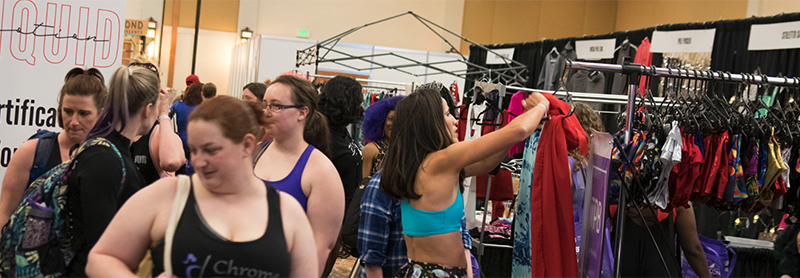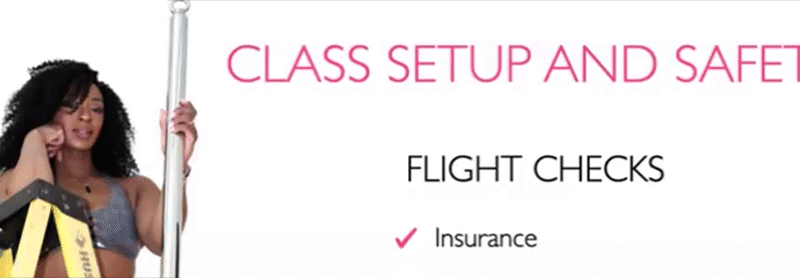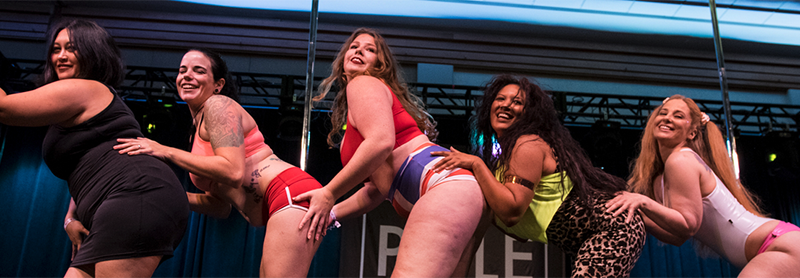A train-cation is a trip (usually away from home) where you focus for a specific…

How to Foster Professionalism in the Pole Industry
Professionalism in its most basic form is how you conduct yourself in a business environment. In a corporate setting, professionalism is often conflated with unimportant issues like appearance and word choice, allowing well-meaning managers to focus on the length of skirts, the color of hair and the use of the word “fuck.” A definition from the internet: “An example of professionalism is a business person who is dressed in a suit and tie, has good manners and shows good business sense.”
In reality, wearing a “suit” has nothing to do with characteristics of personal conduct that comprise professionalism. What really matters is not what a person looks like or how neat their work area is, but how they engage in their business and how they treat other people.
Creative industries – pole or otherwise – often have notorious reputations. Artists are never on time, artists are too creative/different. Artists don’t work hard. Artists are finicky. Artists are temperamental. Artists aren’t professional. This is absolutely not the case.
Characteristics of a Pole-Fessional
Below are characteristics of being professional in our industry. All IPIA members agree to the Code of Ethics to operate their businesses ethically in ways that are based on these characteristics.
Timeliness
Be punctual. Show up on time. Show up slightly early if you can. Respect other people’s time and keep to your schedule. If you agree to a deadline, meet it; exceed it if you can. Respond to messages about your business in a timely manner, typically within 24-48 business hours. Set expectations and then keep them. When you have to miss a deadline, be clear about updated expectations.
Integrity
Do what you say you’re going to do. Deliver on all of your commitments and be reliable. Hold yourself accountable and admit mistakes. Learn from your mistakes. Be resilient and develop ways to foster a win-win environment. Be courteous to everyone, even when you disagree. Give everyone the same chance to succeed. Always start from a win-win mentality: how can we all benefit? Build relationships; don’t tear them down.
Competence
Be an expert in your field of knowledge AND never stop learning. When you learn from someone else, use your integrity and acknowledge their contribution to your expertise. Make sure you are doing the best job you possibly can all the time. Know that there are others with similar skillsets to yours. Find ways to differentiate yourself in a positive manner.
Respect
Listen to someone – really listen to someone – to understand their opinion. Treat everyone, regardless of appearance, experience level or age, gender, style of work, or any other way in which they are different or similar to you, the same. Learn to set appropriate boundaries. Our industry can make boundary setting complicated with many overlaps between friendship and business. Agree to respectfully engage with everyone and maintain clear lines of communication that do not devolve into name calling or social media trolling. Develop a sense of self awareness and learn when you need to step away from an issue or when to enlist a trusted resource for a second opinion.
For the leaders in our community
While all of us should strive to be more professional in how we conduct ourselves and how we interact with our community, the leaders in our industry should be even more concerned with embodying professionalism.
Those of us with large social media followings are leaders, whether we actively agreed to that moniker or not and can influence how current consumers and those not-yet-pole consumers continue to interact with our industry. As Crystal Belcher, a leader in our community, recently noted, “When we don’t consider the actions we take, there is a strong possibility that we not only lose out on our premier investors, but we can leave such an ill taste in their mouth that they close their pocketbooks to the industry at large. We all can be affected by the actions of a few. “
To grow as an industry internally and externally, we need to be united. Being united does not mean being homogenous nor does it mean agreeing on everything. If we spend our time and our energy on building up our industry and our community, then we will grow in tangible ways. There will be more work for everyone, there will be more opportunities to access traditional funding methods, and there will be more customers/students/patrons to enjoy our offerings.
If instead of finding constructive ways to interact with each other that do not devolve into social media trolling and we continue to be unprofessional in our work, then we will not be taken seriously by the outside world. An industry driven mostly by women and minorities and rooted in sex work will always have challenges with a media and government that does not value women, minorities and sex work.
As an industry we need to continue to find appropriate ways to discuss our differences and find ways to work together. No, this does mean that we need to only foster positivity to the extent that it becomes toxic. Rather, we need to realize that we are an industry, we are a business. You might not be friends with everyone or love everyone you encounter in our industry and that is ok, but you should find professional ways to interact with them especially in public spaces.
Regardless of personal opinions, we need to continue to constructively work together, setting appropriate boundaries and developing a baseline of conduct to establish clear lines for all of us as co-workers and co-creators of this industry to work together. We need to continue to create safe spaces not just for physical safety but for the exchanges of emotional energy and social justice, all of which are intertwined in the business lives and personal lives of the people that comprise our industry.
We need to develop appropriate conflict resolution tools and continue to have tough conversations with the goal of improving our industry. And those conversations need to start from the baseline of professionalism, removing or at least minimizing personal opinions for the greater good of the industry.
What’s next
Many of us are interacting professionally with each other. However, we could all improve our interactions, create clearer expectations and provide a better experience for the consumers of our work.
Future conversations through IPIA forums, networking events, webinars and roundtables will help facilitate the continual improvement of professionalism within in the pole industry.



